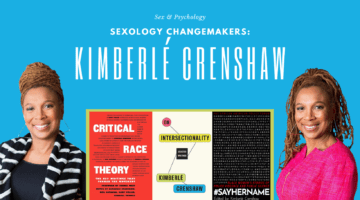We’re Still Failing When It Comes to Clitoral Knowledge
May 4, 2023 by Olivia Adams
Heterosexual men’s difficulty in finding the clitoris has been a running gag in the popular media for quite some time. And there’s more than a hint of truth to it: previous surveys have suggested that somewhere between one-third and one-half of men can’t locate it.
But men aren’t the only ones struggling: as many as one-third of women can’t seem to locate the clitoris, either. This is likely due, in large part, to the fact that “clitoris” is a word that is rarely (if ever) mentioned in a lot of sex education.
Problems around sex ed generally, and especially around pleasure-based education, have contributed to the orgasm gap, or the consistent finding that, on average, heterosexual women reach orgasm with much lower frequency than heterosexual men.
So how much do we as a society really know about the clitoris today? And how might that knowledge be affecting people’s sexual gratification? Let’s dive into the data.
Clitoral Knowledge and Sexual Scripts
Previous research suggests that clitoral knowledge does play a role in sexual satisfaction, but only in specific contexts. For women, knowledge of one’s own body, and particularly clitoral knowledge, is linked to higher orgasm frequency in the context of self-pleasure. Clitoral knowledge doesn’t necessarily translate to more orgasms during partnered sex, though, perhaps due to heteronormative sexual scripts that cast specific expectations and sexual roles onto men and women.
These scripts frequently cast men as the active, initiating partner and women as the passive, receptive partner. As a result, straight women (and frequently bisexual women as well) may have a harder time asking for the kind of stimulation they need in order to experience pleasurable sex with a male partner.
In recent years, more media representation has emerged around women’s pursuit of sexual gratification, including attention to the clitoris and its importance. On an anecdotal level, I see this constantly when scrolling YouTube shorts. For instance, Haley Morris’ series is a great example. But has clitoral knowledge actually increased in recent years, or has the effect of that knowledge changed given previous work on heteronormative sexual scripts?
In a recent study published in the Journal of Sex & Marital Therapy, researchers explored the associations between knowledge of the clitoris, endorsement of gendered sexual scripts, as well as self-reported sexual pleasure (including orgasm frequency) among cisgender, heterosexual persons. 573 adults between ages 18 and 68 took part in this study. Most were also college educated (66.3%) and were in a relationship of some kind (73.8%).
Participants were asked to complete a short, 9-item quiz designed to measure knowledge of the clitoris and to answer questions about their recent sexual experiences and sexual script beliefs.
We’re Failing the Clitoral Quiz
Think twice if you want to invite your cis, straight friend to clitoris trivia night. In this study, participants across the sample answered only about half of the clitoral knowledge items correctly. Women answered more items correctly than men in terms of statistical significance, but that difference was still quite small with women averaging a score of 4.77 out of 9 compared to men’s 4.18 out of 9. A similar study conducted nearly two decades ago reported a correct response rate of 60%, suggesting that clitoral knowledge has not necessarily increased in recent years (if anything, it may have decreased!).
When it comes to the association between clitoral knowledge, heteronormative sexual scripts, and sexual pleasure, this study reported similar findings to previous work on this topic. While increased clitoral knowledge was associated with a lower endorsement of heteronormative sexual scripts, higher pleasure, and more frequent orgasm, this was only true in the context of masturbation.
In partnered sex, clitoral knowledge did not predict high pleasure or orgasm frequency; however, endorsement of heteronormative sexual scripts was negatively associated with the rate of orgasm.
Clitoral Knowledge and Combating Sexual Scripts: A Recipe for Sexual Pleasure
This study offers a couple of key takeaways. First, clitoral knowledge appeared to be lacking within a sample of cisgender, heterosexual adults. Increased attention to female sexuality and to the orgasm gap in popular media sources (e.g., social media, television, and movies) likely has some (however small) influence on how people think about sex. At the same time, though, the researchers emphasize that poor sex education that frequently ignores the clitoris or sexual pleasure in general may play a larger role in overall sexual knowledge.
This combination of limited or nonexistent sex education and the influence of powerful social scripts that inform people how to interact in sexual situations helps to create a perfect storm of uneven sexual pleasure, especially for straight and bisexual women who have sex with men.
There is good news, however. This study suggests that a person’s lack of endorsement of these heteronormative sexual scripts may be a path to more pleasure. Combined with increased sexual knowledge, this can be a great antidote to the existing orgasm gap.
Learn more about this research here.
How much did you learn about the clitoris in your own sex education (if you had it)? And how does that knowledge influence your current sexual experiences? Tell us your thoughts in the comments below.
Want to learn more about Sex and Psychology? Click here for more from the blog or here to listen to the podcast.
Image Source: 123RF/loganban

Dr. Justin Lehmiller
Founder & Owner of Sex and PsychologyDr. Justin Lehmiller is a social psychologist and Research Fellow at The Kinsey Institute. He runs the Sex and Psychology blog and podcast and is author of the popular book Tell Me What You Want. Dr. Lehmiller is an award-winning educator, and a prolific researcher who has published more than 50 academic works.
Read full bio >


